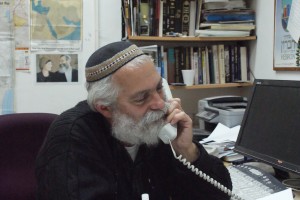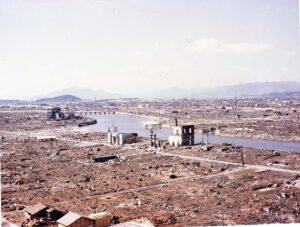Hebron settlers: From secular America to religious Hebron
By Khaled Diab
What motivates an American Jew from a secular background to move to Israel and become a religious settler in Hebron?
Tuesday 4 January 2012

Khaled Diab: Can you introduce yourself?
David Wilder: My name is David Wilder. I work as a spokesperson for the Jewish community here in Hebron. I grew up in the States. I've been in Israel for over 35 years. I've been in this part of Israel for over 30 years. I lived for a number of years in Kiryat Arba. I moved down here 13 years ago. I've been working here for 17-plus years.
What motivated you to move from the States, first, and then to move here?
When I was in university, I had the opportunity to participate in a one-year programme. I had an idea about going to Israel from almost as a child. But I never came over here. I didn't grow up in a religious background.
So your parents were secular?
They were what we call in the States Reform Judaism – what would be called here secular Judaism. But the idea to come to Israel had been floating around. The idea of being able to come for a year in university, get credit for it, be far away from home, have a good time, learn something, and be in Israel at the same time, you know, it was appealing. I came over in 1974, so we're talking a year after the Yom Kippur war. Israel was, you know, something in the news, it wasn't something, you know, hidden away.
So that awoke your Jewish identity or something?
I don't think that that did, but it wasn't… it was tangible, it was something. It wasn't some concept. It was real. And the idea of coming over was, you know, appealing. And I was accepted to a programme, so I came over to Jerusalem. I was at Hebrew University, primarily with Americans, that's the kind of programme it was. I didn't know any Hebrew.
And over that period of a year, I don't know, something shifted. Because my expectation was to come for a year, go back, finish, graduate and go to law school. You know, I sort of had it all set out. But something clicked and pushed me in a different direction. To tell you exactly what that was is very difficult. But that's what happened. I went back and graduated, went back and finished my last year.
When I graduated, I came back, and stayed. I became involved in different things. Very slowly, over a period of time, I became more religious, having become introduced to religious Judaism, which I didn't know anything about before. I was introduced to a woman, an Israeli, we got married.
Was that an arranged marriage or was it a love marriage?
Both. Arranged marriages have a connotation of you meet on the day and you get married. We didn't do that. But many times, you're introduced. The fact that you're introduced to someone doesn't mean you have to marry them. You can be introduced to 50 people before you find someone you want to marry. But I was introduced to somebody and we somehow hit it off. I still don't understand why she liked me but that was 32 years ago and we got married, and the rest is history, as they say.
And you're still together?
Oh, yeah.
And she's a naturalised Israeli like you?
She was born here. Her father was born in Turkey and moved to Cuba and came to Israel in the 1930s. Her mother was born in Jerusalem and her family was originally from Greece. She's Sephardi and I'm Ashkenazi. So we're a mixed marriage, you could say.
And she also shares your religious convictions?
Yeah. We have seven children. Four of them are married and another one is getting married soon. Two are still at home. And a lot of grandchildren.
How many exactly? Do you know?
At the moment, we have 17 grandchildren. I have one daughter who goes in twos; she has two sets of twins. That pushes the numbers up.
So you've created your own veritable mini-tribe.
It's a “hamoula” [clan]. Yeah, you could say that. But look, we're a small family in Hebron. There are families with 11 kids. I think there's a family here with 13 – 13, I think, is the largest in Hebron.
What motivated you to move to Hebron rather than stay in Jerusalem?
We were looking to contribute where we felt we could contribute. You know, do something, the idea that, if you believe in something, don't just talk about it, do it. So we were looking for a place to live on something of a permanent basis and, actually, we sort of fell into Kiryat Arba. We knew somebody who lived there and they told me about an apartment. We didn't have any money, and it was very cheap.
We wanted to try to do something. You know, we were both young. I was studying. I was learning Torah at that time, and I continued for a number of years. And we moved there and we've been here ever since.
And do all your kids and grandkids also live around here or have they moved away?
My grandchildren live with their parents.
Yeah, I know…
I'm old. I'm not that old.
No, no, I understand. My kids are like this: one of my daughters lives here in Hebron. My eldest daughter lived here for 10 years after she got married. Her husband is a rabbi. He teaches in a yeshiva. They wanted to live where he teaches, so they moved down about 20, 25 minutes from here, in the southern Hebron hills, still in what's called Judea, about 20 minutes outside of Be'er Sheva. I have son that lives 10 minutes outside of Hebron, in Beit Hagai. And another daughter who lives in Samaria.
Tell me a little bit about your community here. How big is it?
We have here, today, in Hebron… Ok, let's define terms. There are different ways of defining Hebron. And that's also in terms of numbers and things like that. You know numbers, anyone can do anything they want with numbers. I'm sure you're aware of that. So to try to keep things as straight as possible.
In Hebron itself , today, there are four Jewish neighbourhoods; there are about 90 families; there are about 300 children; there are about 350 guys in the shiva – 850 Jews in Hebron. In Kiryat Arba, there are about 7,500 people. Now if you drive around Kiryat Arba, on the perimeter of Kiryat Arba, there's a fence, on the eastern side. One side of the fence is Kiryat Arba, the other side of the fence is Hebron. So there is a question which I've asked numerous people and never gotten a good answer: if you count that side of the fence as Hebron, then count this side of the fence as Hebron. Ok, you can say that Kiryat Arba is a neighbourhood of Hebron, but it is a separate municipal entity, ok?
The two communities are very interdependent. I mean, we don't have room here for anything. We don't have here a post office or a supermarket or schools, because we don't have any space to put them, or the room we might have, we can't use. So all that is in Kiryat Arba. Hebron is the basis, you know, it's where it started.
If you're talking about the greater Hebron region, we have close to 10,000 Jews. If you're talking about Hebron proper, where we are today, then you're talking about 850 people, plus-minus.
You were talking about how you're very interdependent with Kiryat Arba, but are there differences in the make-up and attitudes between the people in Kiryat Arab and the people here in Hebron?
Look, Hebron, Kiryat Arba, separately or together, they are not a kibbutz, ok? I think that the basic general attitudes; there's a very strong common denominator, for the most part. But this isn't necessarily ideological. You have, I don't know, it's very difficult for me to try to guess percentages or statistics. You may have people who live in Kiryat Arba because it's cheaper than living in Jerusalem. If someone wants to buy an apartment and an apartment in Jerusalem costs a million shekels and here it costs 100,000 shekels, then your mortgage is a lot lower here than it is there.
But I think, for the most part, there is a strong ideological common denominator. But just like anything and everything else, there are differing, you know, different issues, there are different opinions. And your opinions can scale that way, that way, in any given direction. You know, it depends on what you're talking about. There are things that people agree about. There are things that people disagree about.
And between Hebron and Kiryat Arba, they're not, you know… Both communities have a stigma, a stereotype, or a brand, or whatever word you want to use to describe it which may, many years ago, have been accurate, but today… It's good for the media, you know, when they want to smear us.
But, in truth, it's very difficult to characterise any real, major, you know, characteristic.
Look, in Kiryat Arba, you have Russians, you've still got Ethiopians, though there are less Ethiopians today. You've got people they call “manashey”, you know, that have been brought over from India and Pakistan. You've got Ashkenazi, Sephardim, you name it, you've got it. And you've got people from France, and you've got people from the States, and you've got Israelis. And, on a smaller degree, you've got the same here in Hebron.
I don't have the stats for voting. You know, here you vote for parties. But I don't have stats from the last elections, but most people vote here for religious parties.
Part III – “We are not extremists”
Part IV – “I don't like Tel Aviv, does that mean we should tear Tel Aviv down”
Part V – Palestinian people do not exist, are “PR bluff”
Part VI – Living with Palestinian “dhimmis”


